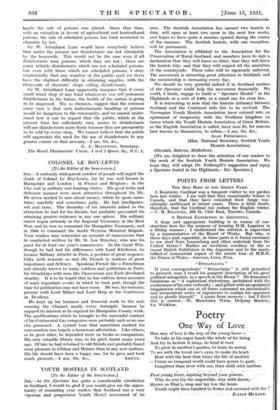COLONEL LE ROY-LEWIS
[To the Editor of the SPECTATOR.] Sin,—A curiously widespread number of people will regret the death of Colonel Le Roy-Lewis, for he was well known in Hampshire and London ; in France and Belgium ; in the City and in military and hunting circles. His good looks and debonair manner were most attractive throughout his life. He never needed to care about money, which he spent some- times carefully and sometimes gaily. He had intelligence, wit and taste. The diversity of his interests added to the attraction he had for his friends, but probably prevented his attaining greater eminence in any one sphere. His military career began seriously in the Imperial Yeomanry in the Boer War, and he rose to command the Hampshire Yeomanry, and in 1908 to command the South Western Mounted Brigade. Your readers may remember an account of manoeuvres that he conducted written by Mr. St. Loe Strachey, who was-his guest for at least one year's manoeuvres. In the Great War, though he had had his differences with Lord Kitchener, he became Military Attaché in Paris, a position of great responsi- bility both towards us and the French in matters of great importance and delicacy. Speaking French like a Frenchman and already known to many soldiers and politicians in Paris, his friendships with men like Clemenceau and Foch developed steadily. It is to be hoped that he has written down accounts of some important events in which he took part, though the time for publication may not have come. He was, for instance, present with Lord Milner and Lord Haig at the Conference at Doullens.
He kept up his business and financial work to the end, crossing the Channel nearly every fortnight, because he enjoyed its interest as- he enjoyed his Hampshire County work. The qualifications which he brought to the successful conduct of his Continental Gas companies were probably such as no one else possessed. A cynical tone that sometimes marked his conversation was largely a humorous affectation. Like others, as he grew older, he depended more on books as companions. His own valuable library was, to his grief, burnt many years ago. Of late he had returned to old friends and probably found more pleasure in Gibbon and Horace than in any new authors. His life should have been a happy one, for he gave and took much pleasure.—I am, Sir, &c., AMICUS.






































 Previous page
Previous page